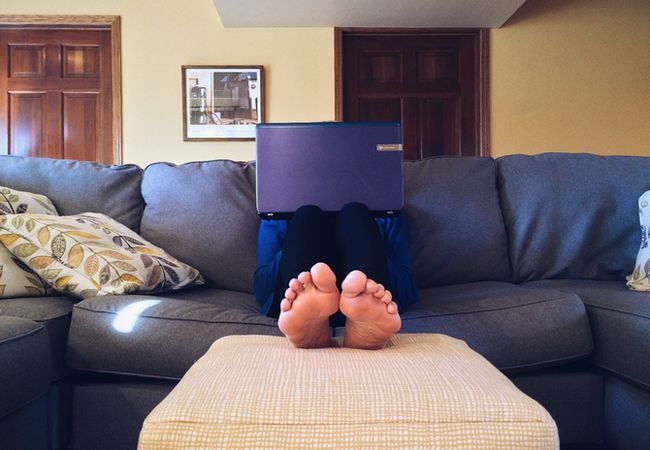Working from home is awesome… On paper! Your friends and family likely look upon you with envy, and why wouldn’t they? In their minds you no doubt enjoy an extra half hour in bed, followed by a leisurely breakfast, a lengthy scroll through your social media feed and (time permitting) maybe even a little light work as they scurry to their offices every morning, staring down rush hour traffic and the grinding tedium of the nine to five. The reality, as we all know, is a very different beast. For work at home types (especially parents), working from home offers a very specific set of challenges.

Sure, we don’t have to commute to work, and yeah it is nice to know that your commute is just a few steps up the stairs or across the hall to your home office on rain and wind swept days where the commuters scurry past your window. Sure, it’s nice to be able to check the news, look in on our friends via social media or do some last minute online Christmas shopping without a boss staring down at us disapprovingly, but working from home is no picnic either. Those of us who work from home work within a vacuum that can be stifling for those involved in the creative or content generation industries such as bloggers or graphic designers. There’s nobody there to cover for us or lend us a hand and we have to be extremely fastidious in our time management if we’re to achieve any sort of work life balance.
These aspects of working from home, while potentially troublesome, can be overcome with time, discipline and experience. There’s one area however in which the self-employed home worker finds herself repeatedly banging her head against the glass ceiling and that’s when it comes to getting a mortgage.
Why mortgages matter
Big deal, you may be thinking, what’s wrong with renting? Well, in principle, there’s nothing wrong with renting property but there are doubtlessly those who consider it dead money. The notion of owning one’s own home is not only personally empowering, it’s an economic advantage and a potential legacy for our kids. As property prices continue to soar to potentially unattainable heights it’s little wonder that many self-employed entrepreneurs want to grab the string before the balloon soars out of reach forever.
Of course, there’s more to property ownership than home ownership. The enterprising spirit that motivates many self-employed people may also motivate them to become property investors and supplement their income with a property portfolio. They may want to branch out into a holiday home so that they can spend some time staying in apartment in Shanghai or in a beach house in Phuket over the holidays. If the employed can enjoy these privileges, why can’t the self-employed?

Why it is harder for you to get a mortgage (and why it is not your fault)
The knee jerk reaction for the self-employed is to assume that it is their fault that getting a mortgage is so hard but it is an unfortunate side effect of the industry fallout following the global financial crisis of 2007-2008. For decades, the deregulation of the financial services industry by the likes of Ronald Reagan in the US and Margaret Thatcher in the UK led incrementally to a culture of recklessness, greed and self-interest. The proliferation of subprime mortgages in the early ‘00s led to an ever-inflating bubble of debt that eventually imploded and many people lost their homes. As a result, banks have become a lot more gun shy when it comes to lending. If you have ever had to approach a bank for business lending, you likely already know how gun shy they have got.
After decades of recklessness causing a potential implosion of their institutions, it makes sense that banks would become far more risk averse, but it’s a shame that risk aversion makes life so difficult for the self-employed.
Nevertheless, here is the thing… While it may be hard for the self-employed to get a mortgage, by no means is it impossible. The seemingly unattainable dream of owning your own property while self-employed can be a reality if you are clever!
Fun fact: there is no such thing as a self-employed mortgage
The notion of a self-employed mortgage is a commonly held myth. The reality is that there is no such thing. That said, there are some mortgage products that benefit or are more attainable for the self-employed. The fine line that self-employed people walk is between finding a product for which you will qualify that still has an agreeable rate of interest. The last thing you want is an interest rate so high that you’re essentially renting from the bank while barely gaining any equity on your home. This is why a good financial advisor and a mortgage broker are worth their weight in gold.

What you will need to get a mortgage
Now that we have established that there is no such thing as a self-employed mortgage, it is an unavoidable fact that you will have to jump through more hoops than your salaried friends to get the same products.
The more evidence you can provide the better. If you have been self-employed for less than two years, you are unlikely to be taken seriously by a mortgage lender. Most providers expect to see two years’ worth of accounts for your business, although if you have more it can only help your application. If you have a laissez faire attitude towards your accounts and bookkeeping now is the time to go over the books with your accountant (and a fine toothed comb). The more detail you can provide, the more fiscally responsible your business appears and the more seriously you will be taken. Besides presenting yourself impeccably when you go to the meeting itself, you will be expected to provide the following:
- A good credit history
- An accountant and two years’ worth of professionally maintained accounts
- A track record of regular work
- A healthy down payment
If your credit history is less than stellar, it may be worth considering taking out a consolidation loan. This is advantageous to your credit rating as it consolidates all of your existing debts into a single new one. If you have numerous debts each with its own interest rate, consolidation can make your debts easier and less stressful to manage, too.
It’s entirely possible that you will need a bigger down payment than a salaried worker with an equivalent income will. While some lenders may accept accounts that you’ve maintained yourself, others will insist on going through an accountant. They may even insist that your accountant be certified or chartered. That said, if you’re self-employed a chartered accountant is always a worthy investment as they’re likely to help you save far more than they cost.

How your business setup may affect your chances
Few self-employed people realize that the nature of their self-employment is a very important factor in their ability to secure a mortgage.
If you are a sole trader, good news! This is as straightforward as it gets when ascertaining your income. Since all business profits are yours, a lender will take it as read that the profits are your income. For business partners it is slightly more complicated. A mortgage lender will look at the business profits and each partner’s share of the profits to see if you can afford to keep to the terms of the mortgage. If you have set up a limited company this represents a delineation between your business and personal affairs. If you are the director of your limited company it is likely that you pay yourself a salary and it will be this that the lender takes into consideration when making a decision.
If you’re fastidious in your records and can prove your income and record of financial responsibility, getting a mortgage may just be easier than you think.